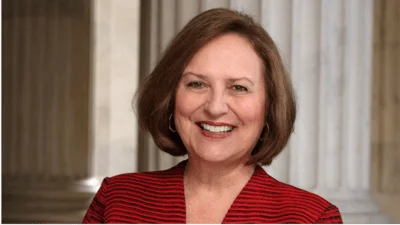When Civil War veteran John M. Fagan became a resident at the Lincoln Regional Center, it was then known as the Nebraska Hospital for the Insane. And when he died in March 1892, he became patient #2459 in one of the two Lincoln Regional Center cemeteries.
Fagan, along with 14 other veterans buried in the two cemeteries at the Lincoln Regional Center, was honored Wednesday, Nov. 9, in a pre-Veterans Day recognition ceremony at the Haines Branch cemetery.
In Fagan's day, having a behavioral health crisis was something families swept under the rug. Having a relative in a psychiatric hospital was widely viewed as a source of shame, so the great majority of the men and women who died at the three Regional Centers were buried with only a patient number to mark their graves at the Lincoln Regional Center, as well as the Hastings Regional Center (then known as the Asylum for the Chronic Insane), and the Norfolk Regional Center (then known as the State Hospital for the Insane).
Since that time, our understanding of the fallout of war, especially post-traumatic stress disorder (PTSD), has made significant strides.
Known as shell shock or combat fatigue, PTSD affected many of the soldiers buried at the Lincoln Regional Center who fought in a variety of conflicts, including the Civil War, the Spanish-American War, and World War I. The condition occurs after experiencing severe trauma or a life-threatening response. While it is normal to feel shock after such an event, PTSD is diagnosed after the survivor's nervous system gets “stuck" in that feeling for the long-term. The survivor may experience flashbacks, bad dreams, negative thoughts or feelings of guilt and blame, and avoid places and objects that remind them of the primary event.
“We've come a very long way from the time that people were only recognized with a number on their grave," said Larry Kahl, chief operating officer of DHHS. “While the stigma has gotten better, we still have more progress to make. Events like this help us break down those walls and empower people to seek treatment."
The push to recognize fellow soldiers and honor their service was initiated by retired Army Colonel Larry Nelson, who served in both the Army Reserve and on active duty for 37 years, including serving as presiding officer of an administrative review at Guantanamo Bay, Cuba. He is also a retired member of the Lincoln Police Department.
While attending a training event at the Hastings Regional Center (HRC) in 2010, a colleague took Nelson to the HRC's cemetery and pointed out the significant number of headstones that only contained a number. After learning these were patient numbers, he was inspired to identify and honor the veterans at each of the cemeteries.
“War changes people," said Nelson. “Veterans returned to their homes as a person who was not the same as the one who left. In dealing with 'battle fatigue,' or 'shell shock,' or 'hysterical neurosis,' turning to alcohol and/or drugs or both, or just going off the edge with negative behaviors was not uncommon. If a mental institution was a lower-cost way of finding assistance for their loved ones, many opted for it."
Nelson worked closely with Rachel Johnson, the Lincoln Regional Center's religious coordinator, to undertake a comprehensive search for fellow veterans by digging through records dating back to 1870, the year the original hospital was built. Nelson, along with DHHS and LRC administrative support and the Lincoln Regional Center's health information management staff, dedicated hundreds of hours of time reviewing old handwritten folios and microfiche.
“Every time we delve into the history of our cemetery and the persons interred here, we bring dignity to their lives and to all those who live with the stigma of mental health challenges," said Johnson. “LRC has been honoring the persons buried on our grounds annually for over four decades, but over the years the one piece that was missing was the identification of our veterans. Unlike other military dead, these heroes have laid here, unnamed, and unrecognized for a very long time. Now we can speak their names and give voice to their service - and their struggle. This recognition is not just about honoring the past, it's also about allowing them to speak a word of encouragement and hope for today."
A tireless advocate for his fellow soldiers, Nelson also has interviewed hundreds of veterans for the Veterans History Project, an organization that keeps military history alive through accounts of those who fought in war. A copy of all the interviews Nelson has done are in the Library of Congress.
Preventing veteran suicide is a cornerstone of a new initiative championed by Gov. Pete Ricketts. Nebraska is one of 35 states taking part in the Governor's Challenge to Prevent Suicide Among Service Members, Veterans, and Their Families. The initiative is taking place under the direction of the U.S. Department of Veterans Affairs and the Substance Abuse and Mental Health Services Administration (SAMHSA). In Nebraska, the Nebraska Department of Veterans Affairs and the Nebraska Department of Health and Human Services are the leads on the program.
Help is available. If you or a loved one need assistance, please reach out to:
- Your faith-based leader, your healthcare professional, or student health center.
- National Suicide Prevention Lifeline: Dial 988 from your landline or cell phone; press 1 to speak to a military counselor
- Nebraska Family Helpline – Any question, any time. (888) 866-8660
- Rural Response Hotline, (800) 464-0258
- Disaster Distress Helpline: 1-800-985-5990 (oprime dos para Español) or text TalkWithUs to 66746.
- National Domestic Violence Hotline: 1-800-799-7233 or text LOVEIS to 22522
- National Child Abuse Hotline: 1-800-4AChild (1-800-422-4453) or text 1-800-422-4453
- National Sexual Assault Hotline: 1-800-656-HOPE (4673)
- Nebraska Regional Poison Center, 1-800-222-1222




 Alerts Sign-up
Alerts Sign-up